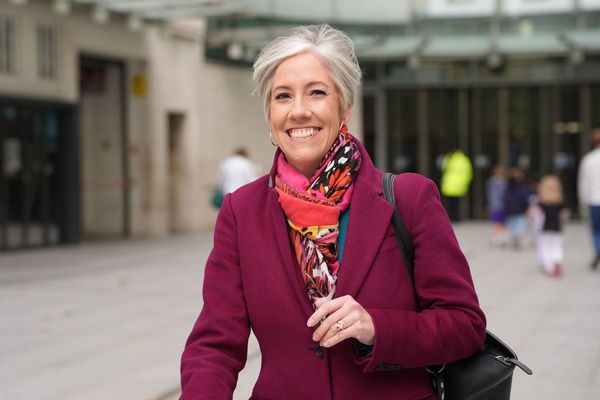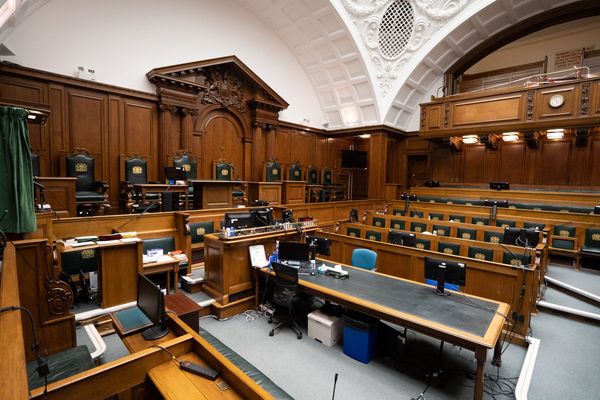Bill Onus was a champion boomerang thrower, showman and a revered Aboriginal civil rights activist, but a new documentary adds another layer to the legend: first Aboriginal filmmaker.
In Ablaze, opera singer and academic Tiriki Onus traces the origins and content of a recently unearthed 1946 short film that appeared to be made by his grandfather.
"I think the biggest revelation for me, throughout this whole journey, has been about the strength and resilience required by our communities," Tiriki told ABC Arts.
"The very fact that I'm here, that we tell these stories — they get passed down as myths in our families, about the great people that our forebears were."
Premiering online at the Melbourne International Film Festival on August 16, Ablaze was directed by Tiriki and Alec Morgan (the latter co-directed the groundbreaking 1983 documentary Lousy Little Sixpence).
Alongside the nine-and-a-half minutes of black and white 1946 film, the 90-minute documentary is filled with animations and additional footage that speaks to Bill's artistic and political achievements — including his unparalleled oratory skills while leading the Victorian fight for the 1967 referendum.
Aboriginal and Torres Strait Islander readers are advised that the following contains images and names of people who have died.
Morgan says: "I think both of us felt that Bill had been left out of history … and my theory is that Bill was left out because he was so radical in what he was saying — and even what he's saying back then is really relevant today.
"[We made the film] to rightfully put him back into Australian history."
'I was blown away'
Morgan is a filmmaker and academic who has spent decades working in archives, with a focus on Indigenous film.
In 2013, a National Film and Sound Archive (NFSA) curator showed him a short film with no clear records or sound associated with it (the voiceover reel having been lost).
Morgan quickly recognised Bill and his brother Eric Onus in the film, with Eric appearing alongside his wife Wynne in an excerpt of a stage play depicting Aboriginal people in chains.
"I just thought it [the play] was incredible, I'd never seen anything like it," says Morgan.
"There was real history in this 10-minute piece of footage."
Tiriki recalls Morgan calling him up to say: "Did you know your grandfather was probably the first Aboriginal filmmaker? I've found this film."
Tiriki knew his grandfather had made films but had thought — like the rest of his family — that the films had all been lost in a caravan fire in the 50s.
Morgan brought the film down to Melbourne to show Tiriki.
"I was blown away because this was unlike anything else I'd seen, particularly from the era," says Tiriki.
The 1946 film includes footage of Aboriginal residents of the inner-Melbourne suburb of Fitzroy, including famous Gunditjmara warrior and World War II soldier Reg Saunders, and pastor Doug Nicholls.
"Here was a very different picture of Aboriginal Melbourne, that showed people in what I thought was a very strength-based dialogue," says Tiriki.
Morgan and Tiriki embarked on a six-year journey — prolonged in part by COVID-19, but mostly by funding challenges — to determine the origins and authorship of the 1946 film.
"It was difficult to have to battle for so long to get all the funding and everything together … but it's given us all of this time to really delve deeply into this whole detective story," says Tiriki.
'A fuller picture of Bill'
Morgan says a postdoctoral research fellowship gave him the time to research and trace the provenance of the 1946 film.
But a key early breakthrough was Tiriki's discovery of a series of photographs and letters in a suitcase owned by his grandfather, which turned out to have undeniable links to elements of the 1946 footage.
Tiriki and Morgan were also able to draw on the Australian Security Intelligence Organisation's files from the years in which it was monitoring Bill and other filmmakers and Aboriginal activists.
"We went on to find that there were more pieces that Bill had a hand in that were out there, [and footage] that had survived. And we were able to build up a fuller picture of Bill," says Tiriki.
After leaving his job as a boomerang thrower in a travelling show in the 30s, Bill set his sights on filmmaking — and landed his first film gig, on Charles Chauvel's 1936 film Uncivilised.
But in 1939 he put his filmmaking ambitions on hold to return home to the Cummeragunja reserve, to assist with the walk-off, one of the earliest and most significant Aboriginal resistance efforts.
After the walk-off, Bill and his family settled in Fitzroy, where he began agitating for Aboriginal rights alongside pastor Doug Nicholls, one of the founders of the Aboriginal Advancement League (which Bill would become president of, in 1967).
In 1945, Bill's activism and filmmaking intersected while he was working on Harry Watt's film The Overlanders, in northern Australia. During the shoot, Bill witnessed the violent treatment of Aboriginal stockmen — including the use of chaining.
While his request to document the situation was rejected by Labor heavyweight Arthur Calwell, Bill wrote the scenario into a play about the Pilbara strike titled White Justice, created as a collaboration between the Aboriginal Advancement League and Melbourne's New Theatre.
This is the play that appears in the 1946 film.
Bill had plans to distribute his film in cinemas, but Ablaze suggests that Commonwealth Investigation Service agents may have pressured distribution companies into not releasing the film.
The filmmakers aren't sure how the film landed in the NFSA many years later.
'These stories belong in place'
Ablaze is a testament to the importance of archives, particularly for Indigenous communities.
"I lie awake most nights thinking about the stuff that's still in the archives," says Tiriki.
"We're at a point where we have [still] got our elders who are connected to so many of these stories and still have these memories … [and] we've got archives that we can interpret.
"There's such a wealth of knowledge there that we can reclaim."
But he says this reclamation and archival work is often left to First Nations people.
"This is one of the reasons I'm so passionate about intercultural collaboration in a work like Ablaze, and in the work that I do in the world more broadly — because I think there's a real role that we can all collectively play.
"And as we find more opportunities for allyship and for non-Indigenous people to amplify the voices of Indigenous people, we're going to be able to reframe a lot of those archives and give them back to our communities, and be able to celebrate them together."
In Ablaze, we see Tiriki take his grandfather's short film to the community of Warralong, where he shares it with the descendants of the Pilbara strikers.
He told ABC Arts that his aim is "to empower and give back to my mother and father countries and communities, because I think these stories belong in place".
Keep the story going
From travelling shows and the stage, to films and his shop in Belgrave where he sold Aboriginal art and crafts, Bill believed in the importance of art for Indigenous rights and cultural preservation.
"I think that was a really fascinating part of this process," says Tiriki. "[To see how Bill and others were] taking practices and the forms of the colonised environment and turning them to one's own end.
Tiriki had three children during the making of Ablaze, and the film opens with him wrapping his eldest child in a Biganga (possum skin cloak).
Tiriki has learnt how to make Bigangas using traditional methods, and his daughter was the first child in his family for seven generations to be wrapped in a cloak at birth.
"This had been passed down from my father to me and from his father to him before that, this promise that one day we would make cloaks again … if we kept the story going, it would come back," he says.
Before Ablaze, Bill's protege Bruce McGuinness (Blackfire, 1972) was credited as the first Aboriginal filmmaker.
Tiriki says: "We've proven unequivocally that Bill was making films in the 40s and 50s … but I say he 'might' [be the first Aboriginal filmmaker] because I wonder what else is in the archives?"
"People often put a lot of stock in this idea of being the first — but I actually don't care. I'm much more excited about the idea of legacy, of community … and being part of something that's much bigger."
Ablaze is Tiriki's first film, but it won't be his last as he continues working with Morgan.
"There are many more stories yet to be told."
Ablaze is available to stream through MIFF Play from August 16 until August 22.







